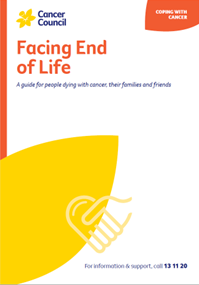- Home
- Cancer Information
- Advanced cancer
- Facing end of life
- Common questions about dying
- What does “dying well” mean?
What does “dying well” mean?
People often talk about wanting to have a “good death”. What dying well means is different for each person, shaped by their attitudes, cultural background, spiritual beliefs and medical treatments.
You may want to think about what dying well means to you. You may feel it is important to:
- know that death is coming and understand what to expect
- have some control over pain relief and other symptoms
- have as much control as you can over where you die and how it happens
- maintain a sense of dignity
- have the opportunity to prepare for death
- reconcile damaged or broken relationships
- have the chance to say goodbye
- resolve regrets
- honour spiritual or religious beliefs
- have a say in end-of-life care and know your wishes are respected
- have your affairs in order and plans in place for friends and family.
There are different ways to die well. Some people see staying at home as the key to dying well, while others feel more supported spending their last days in a hospital or palliative care unit (see Choosing where to die). You don’t have to decide in advance and it is okay to change your mind later. But it is important that family, friends and your health care team understand what matters most to you. Knowing your wishes have been explained clearly, means that you don’t need to have those conversations later on.
Open conversations and planning ahead for your last weeks and days of life can help family members and friends with their grief. They may feel a sense of peace knowing your preferences were respected (e.g. advance care plans, where you want to be cared for or where you prefer to die).
→ READ MORE: How will I know that the end is near?
Podcast: Living with Dying
Listen to more episodes of our podcast for people affected by cancer
More resources
Prof Jane Phillips, Head, School of Nursing and Professor, Centre for Healthcare Transformation, Queensland University of Technology and Emerita Professor Palliative Nursing, University of Technology Sydney, NSW; Prof Meera Agar, Palliative Care Physician, Professor of Palliative Medicine, University of Technology Sydney, IMPACCT, Sydney, NSW; Sandra Anderson, Consumer; A/Prof Megan Best, The University of Notre Dame Australia and The University of Sydney, NSW; Prof Lauren Breen, Psychologist and Discipline Lead, Psychology, Curtin University, WA; David Dawes, Manager, Spiritual Care Department, Peter MacCallum Cancer Centre, VIC; Rob Ferguson, Consumer; Gabrielle Gawne-Kelnar, Counsellor, Psychotherapist and Social Worker, One Life Counselling & Psychotherapy, NSW; Justine Hatton, Senior Social Worker, Southern Adelaide Palliative Services, Flinders Medical Centre, SA; Caitlin MacDonagh, Clinical Nurse Consultant, Palliative Care, Royal North Shore Hospital, Northern Sydney Local Health District, NSW; McCabe Centre for Law and Cancer; Palliative Care Australia; Belinda Reinhold, Acting Lead Palliative Care, Cancer Council QLD; Xanthe Sansome, National Program Director, Advance Care Planning Australia; Kirsty Trebilcock, 13 11 20 Consultant, Cancer Council SA.
View the Cancer Council NSW editorial policy.
View all publications or call 13 11 20 for free printed copies.
Need to talk?
Support services
Support for carers
Speak to a health professional or to someone who has been there, or find a support group or forum
Cancer Council Online Community
A community forum – a safe place to share stories, get tips and connect with people who understand
Cancer information
Advanced cancer
Information for all stages of advanced cancer, from the initial diagnosis to palliative care and grief
Information for carers
Information for family and friends providing care to someone at any stage of cancer

